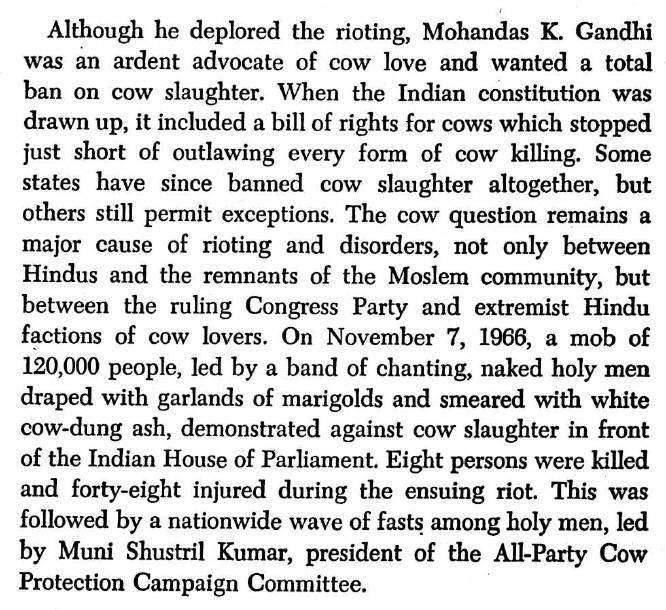
People and Animals
An Anthropological Perspective
Here is a quote from Marvin Harris' book, Cows, Pigs, Wars, and Witches:

To most Americans, who like to think of themselves as rational, the behavior described above on behalf of cows seems rather bizarre. Demonstrations against cow slaughter? A bill of rights for cows? Are these people crazy? Yet, while we Americans devour copious amounts of beef and accuse Hindus of an irrational obsession with cows, we refuse to eat horsemeat --even though horsemeat is just as nutritious as beef and is made from the same parts of a horse as the meat we eat is from cattle. In the meantime, we export over 100 million pounds of horsemeat each year to Europe and Japan. We instead treat the horse as a protected species, even introducing an initiative on at least one state ballot to criminalize the butchering of horses for export. Furthermore, as the article below illustrates, we create sanctuaries for the protection of horses in the same way that Hindus create sanctuaries for the protection of cows. Is our protection of horses any more logical than the Hindu protection of cows?
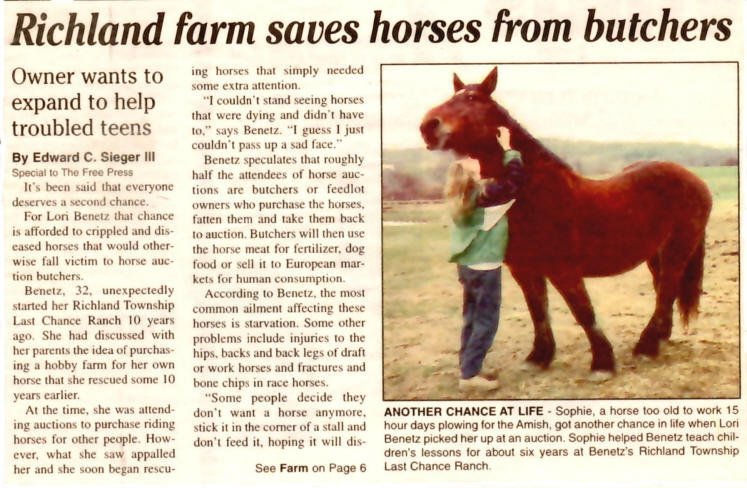
|
|
|
|
|
The man in the picture to the left is delivering dogs to a restaurant in Hanoi, and the man below is selling cats in a food market.
While people throughout Asia consider dogs a fully acceptable food to eat, most Westerners, including most Americans, would view the eating of dogs and cats as disgusting.
Yet, we house about 15 million dogs and cats in animal shelters every year. If we were being completely rational in our use of resources, wouldn't we utilize this potentially valuable food resource instead of letting it go to waste?
|
Rather than eat dogs and cats, Americans create cemeteries where people can bury them and come to mourn their death.
|
|
Imagine what the Chinese would think of us if they saw our pet cemeteries!
|

The fact is that many pets in the U.S. live better than do many people, as the article below indicates.
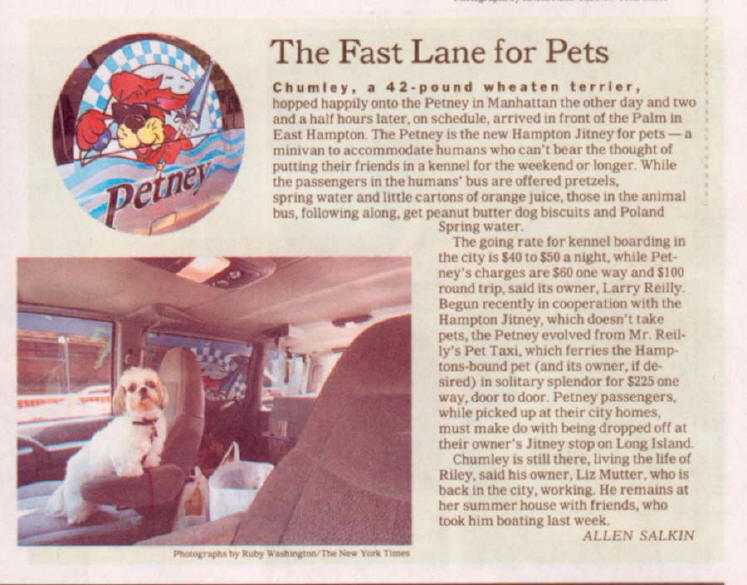
Here is an article from The Economist which focuses on the rather obsessive treatment of dogs in the U.S. I wonder what someone in Hong Kong would think of Americans if they happened to read this article while eating a dog in their local restaurant.
|
The New York Scene
The Economist Feb 12th 2004
|
|
MASSAGE, blow-drying, temper tantrums, big hair, therapy, diets, spas, disdain, treadmills, flashing cameras and bitches from hell. All are expected and, indeed, accepted elements of New York's Fashion Week. They also loom large in this week's other event, the Westminster Kennel Club Dog Show.
In both, the real show is behind the scenes. In the benching area, contestants have their coats brushed, their split ends trimmed and their fur fluffed out with mousse. (Shefaro Alejandro's Mariska, a successful borzoi, uses only Canadian hair products.) Claws are meticulously shaped, teeth cleaned.
Some handlers apply mascara and eyeliner; a few are said to attach hairpieces, which is not allowed. A past winner of Crufts, the British equivalent of Westminster, was rumored to have had a face-lift (later proved to be untrue). Some dogs are so desperate to win that they have not only groomers and handlers, but also agents.
Les Poochs, a boutique which styles itself “the Louis Vuitton of the dog world”, makes a killing at Westminster. Japanese ergonomically designed shears sell for $2,000. “Pooch de Noël” fragrance goes for $500 a bottle, Italian leather collars and leashes for as much as $5,000. Les Poochs' couture shampoo not only detangles, but is PH-balanced and causes no tears.
Several stalls sell dog food, but not just any old kind. Some sorts promise to reduce cell damage and improve skin and coats. Some help the overweight: one vendor describes his product as a doggie version of the Atkins diet. Others sell nutritional supplements to improve canine vision and joints.
Across the street, in the basement of the Hotel Pennsylvania, contestants can unwind in the salon and spa. The spa promises to condition the canine mind, body and spirit. Some mutts work out, using jog-a-dog treadmills. Others make for Dana Dymoke, a professional masseuse, who works in a curtained-off room with muted lights, candles and ocean sounds. So popular is Ms Dymoke that she refused to speak to The Economist, saying,“I'm with a client.”
The next big event at Madison Square Garden will be the Republican National Convention. Look for similar levels of primping and stress, but slower sales of Italian bondage gear.
And many Americans experience a severe personal loss at the death of their pets, to the extent that pet sympathy cards are not uncommon. . . .
|
|
|
Many Americans even become so concerned about the emotional well being of their pets that they purchase artificial testicles (Neuticals) for their dogs in order to minimize the psychological trauma that their dogs might feel as a result of being castrated. . . .
|
"If Dogs Could Talk, They'd Say, 'Are You Crazy?'" by Douglas Martin New York Times August 8, 1999
IN "The Lorax," Dr. Seuss wrote about "thneeds," an absolutely useless product for which an entire forest is destroyed. Compared to what you are about to read, thneeds seem essential.
This is a story about artificial testicles for pets. Some 25,532 sets were said to have been sold in 50 states and 14 countries -- including one for a horse in Louisiana that was outfitted two weeks ago -- and ain't capitalism grand?
The inventor and manufacturer of the gumdrop-shaped implants, Gregg A. Miller, who lives in a suburb of Kansas City, came up with the idea seven years ago when he had his 200-pound bloodhound Buck neutered. Three years later he patented "Neuticles," just as profits from a previous invention, candy in a tube, had dried up. And he has expanded the line to include other animals, particularly cats.
The cheaper polyprophylene model sells for $25 to $32 a set; the newer solid silicone alternative, called "Neuticle Naturals" sells for $80 to $129. The implantation procedure takes two or three minutes, and there have been no reported medical complications. "It's as easy as changing a light bulb," Mr. Miller said.
But why?
Some experts suggest it is not done for the pets. "The dog doesn't care," said Sean Aiken, a surgeon at the Animal Medical Center in Manhattan. "Very few dogs are truly vain."
"Dogs could care less," Laura Keagy, office manager of the Beverly Hills Small Animal Hospital, which offers neuticles. "But a lot of clients have trouble with a male dog being castrated."
Dr. Sheldon Yessenow, a veterinarian at the Oronoque Animal Center in Stratford, Conn., said a client had asked for neuticles and that he had dutifully ordered some. But when it came time to do the operation, he could not install them.
"I thought it was ridiculous and unethical," he said, saying if the dog ran away and ended up with new owners, he might end up getting neutered twice.
But this is a time when lots of people will do seemingly anything for their pets. There are pet vacations, pet gourmet foods and pet perfumes. Pets get hip replacements, cataract operations and dental jobs. About the only thing they don't get is plastic surgery. Indeed, the clipping of ears and tails of some breeds is on the downswing. (It's illegal in Britain.) Floppy-eared Dobermans have won dog shows.
"Everyone is tending toward a more natural look, including the dog world," Ms. Keagy said.
Mr. Miller's contention is that dogs do know the difference, and that they suffer from what he calls "post-neutering trauma." He asked, "Why wouldn't they know they've lost an important body part?"
But do they dwell on it? Ingrid Newkirk, president of the People for the Ethical Treatment of Animals, thinks not. "It's like switching from regular to skim to soy milk," she said. "You get adjusted to it."
Alan Manevitz, a psychiatrist at New York Presbyterian Hospital, suggests that people are showing a good side of themselves by investing their animals with concerns that are important to human beings. "It's identifying with suffering," he said. "It has a sweet quality to it, actually."
One question remains. Does Buddy, the First Family's chocolate Labrador, have Neuticles? Mr. Miller claims to have gotten a personal thank-you note from the President after sending a pair at the time of the dog's neutering.
"I never saw or heard anything about any unusual features," said Barry Toiv, a White House spokesman. "But I'll check on it."
He did. No Neuticles.
|
* * * * *
Then there is Napoleon Chagnon's description of the Yanomamo Indians in Venezuela, who cultivate and eat the larvae of insects that inhabit dead and decaying palm trees. . . .
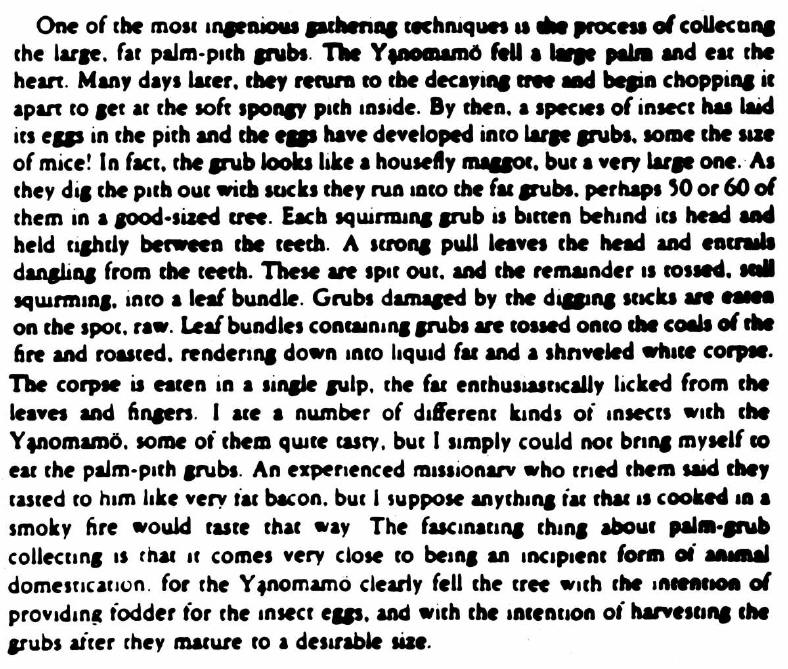
|
Most Americans would likely find eating insects quite repulsive. Few Americans, however, have likely ever considered the nutritional value of insects. As the table below clearly shows, many insects are high in protein, calcium and other nutrients. Older women, who are prone to osteoporosis (the result of too little calcium), might well want to consider making crickets a regular part of their diet. For the Yanomamo, who subsist primarily on plaintains from their gardens (which contain less than 1% protein) insects provide a valuable food source that complements a diet high in carbohydrates.
|
|

Food likes and dislikes are not "natural". They are acquired as a member of a particular society. This is indicated by the fact that there are clearly definable gender differences in food aversions in the U.S. As the table below indicates, For example, men are four times as likely to avoid eating celery as are women, while women are seven times as likely to avoid eating nuts.
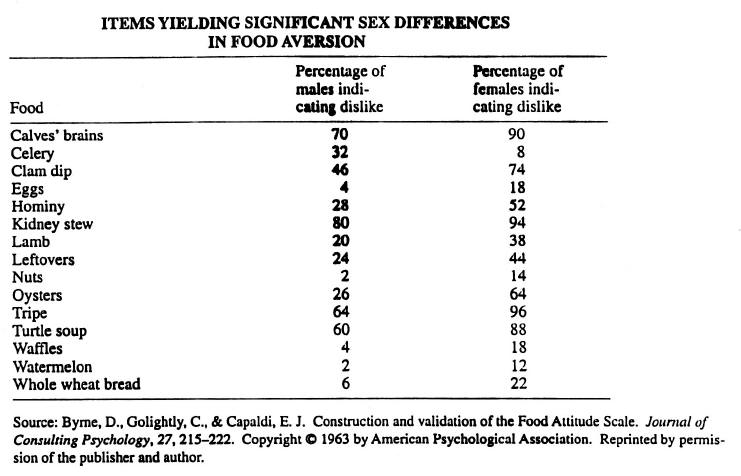
* * * * *
The Politics of Food
Animals in the form of food has, in recent years, become a hot political issue. In the United States, organizations such as PETA (People for the Ethical Treatment of Animals) have recently begun to promote vegetarianism as a way of preventing the slaughter of animals.
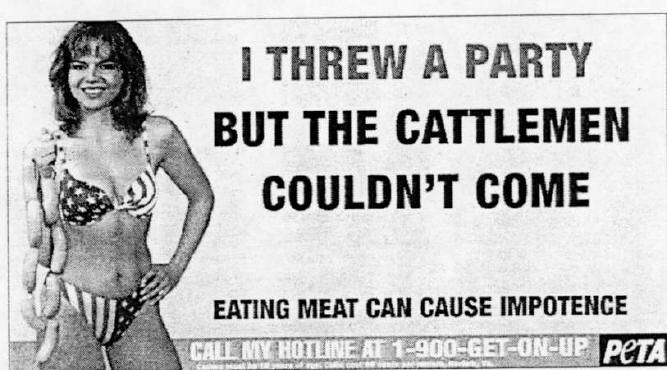
|
PETA even asked Timothy McVeigh, who was convicted of killing 168 people during his bombing of the Oklahoma City federal building, if he would request a vegetarian last meal in order to promote the ethical treatment of animals.
|
|
|
|
There have been numerous demonstrations against the use of animals in medical experiments, and against the slaughter of animals for food. Some of the most violent demonstrations have taken place in Great Britain, where tolerance for animal rights demonstrations is widespread.
|
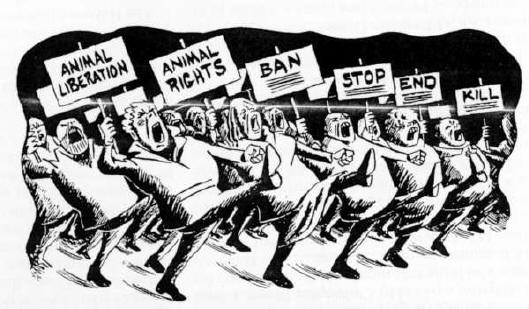
|
|
This McDonald's restaurant in Paris was attacked in order to protest American agricultural policies.
|
Americans, on the other hand, maintain a different attitude towards meat than do many Europeans. Beef is a major part of the American diet, and vegetarianism has not become a volatile political issue, as it has in parts of Europe. American agriculture has also taken the lead in developing new technologies to enhance beef and other meat production. Many Americans would sympathize with the sentiments expressed below:
|
|
If you are not supposed to eat animals, . . .
. . . then why are they made out of meat?
|
|
or
|
The other white meat |
or even
|
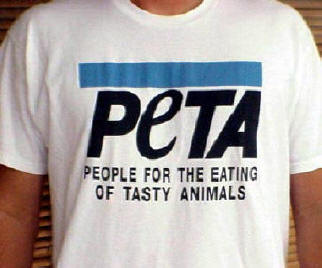 |
However, there are also new ideologies about animals that are emerging in the U.S. which have both social and political implications. Many feminists, for example, view the slaughter of animals as part of the larger exploitation of nature by "patriarchal" societies and promote vegetarianism as the feminist alternative. Here is an email that I received from a female friend of mine about a coworker of hers.
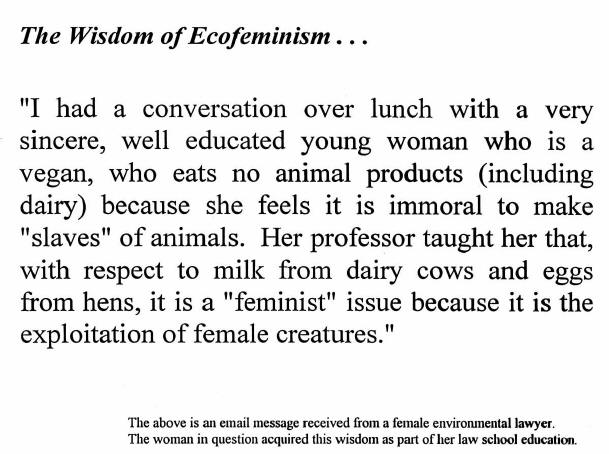
In the meantime, some animal rights lawyers are already preparing legal briefs that will be used to gain legal rights for animals comparable to those currently in effect for humans.
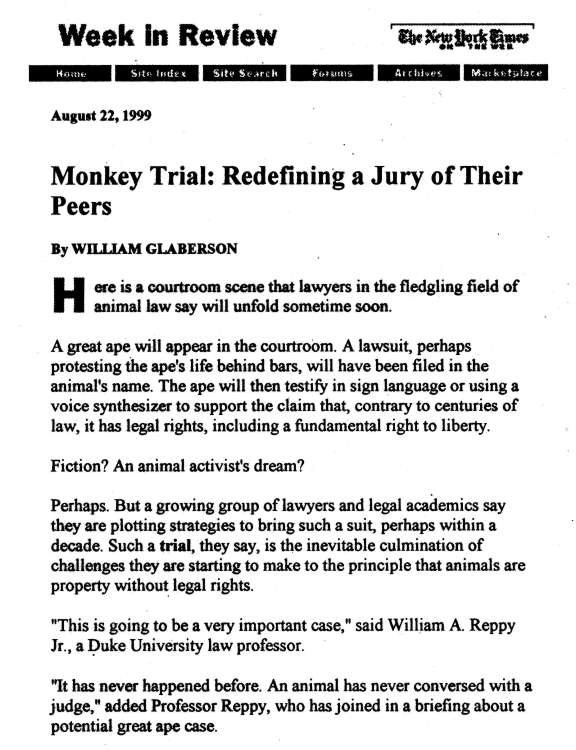
|
|
He's Not Hairy, He's My Brother
By Seth Mydans New York Times August 12, 2001
Here's one way to look at the man-versus-ape conflict in the new movie "Planet of the Apes": It's civil war.
With some people still upset over Darwin's theory, which suggests that apes are our grandparents, along comes an even more unsettling view: we are just another breed of ape. In the great pyramid of nature, according to this view, one little group of siblings is isolated at the top, separated by a huge biological gap from lower beings. These emperors of evolution are chimpanzees, gorillas, orangutans, bonobos and (are we forgetting one?) humans.
"If man is made in God's image," Allan Wilson, a professor at the University of California at Los Angeles, once said, "then God must be a chimpanzee."
It is one of the great conceptual advances of science in the last decade to link the five "great apes" including man into one biologically similar group. Advocates for the other four say the group is distinct from what they classify dismissively as "animals."
Humans and chimpanzees, they note, are 99 percent identical genetically, have similar blood groups and similar brain structures and show near-identical behavior in their first three years of life. All five hominids are unique in sharing human-like characteristics that scientists group under the labels self-awareness, theory of mind and incipient moral awareness.
"In other words, the special mental qualities that make human life so precious in our moral and legal systems are also shared by our closest cousins," said Rowan Taylor, a publicist for the Great Ape Project, an ape-advocacy group.
"It's actually an injustice to call chimpanzees and orangutans `animals,' " he said. "It puts them in with rabbits and a whole variety of organisms that they are not close to. And it separates them from us, who apart from the hair and certain features of anatomy you'd have a difficult time defining a significant difference."
Like Shylock, these advocates cry, "If you prick them, do they not bleed? If you tickle them, do they not laugh?" Or, as Richard Wrangham, a chimpanzee behavior expert at Harvard University once put it: "Like humans, they laugh, make up after a quarrel, support each other in times of trouble, medicate themselves with chemical and physical remedies, stop each other from eating poisonous foods, collaborate in the hunt, help each other over physical obstacles, raid neighboring groups, lose their tempers, get excited by dramatic weather, invent ways to show off, have family traditions and group traditions, make tools, devise plans, deceive, play tricks, grieve, are cruel and are kind."
As research continues, long-held distinctions between the species continue to dissolve.
The logical outcome, the advocates say, is human rights for apes. They quote the scientist Carl Sagan, from his book "The Dragons of Eden": "If chimpanzees have consciousness, if they are capable of abstractions, do they not have what until now has been described as `human rights'? How smart does a chimpanzee have to be before killing him constitutes murder?"
Rights for apes, the advocates argue, is simply the next step in the development of a moral society where no group is denied its fair place whether it has a different skin color or ethnic background, whether it is disabled or mentally impaired, or whether it is covered in hair.
"Think of it as a continuum," said David Penny, a theoretical biologist at Massey University in New Zealand. "As recently as 100 or 150 years ago, it wasn't accepted that all humans should be treated as equal. Torture was normal 300 or 400 years ago, even in Europe. Slavery was normal in many parts of the world. Ignoring children's education was standard in many places. Capital punishment is slowly disappearing."
The first rights the advocates are seeking for apes are: not to be deprived of life, not to be subjected to torture or cruel or degrading treatment and not to be subjected to medical or scientific experimentation.
In addition, there is a movement under way to recognize the other four great apes as "persons" under the law, rather than property. As with young or intellectually impaired humans, that lobby says, apes should be provided with guardians to safeguard their rights and, should the need arise, plead their cases in court.
Like the great civil rights leaders of the 1960's, these new advocates have a dream, and it is to persuade the United Nations to adopt a Declaration on Great Apes, a sort of updated version of the Universal Declaration on Human Rights.
Such a move may seem, if not impossible, then impossibly far off. But in the great continuum that is the law, the ape advocates have already won a victory. Two years ago, New Zealand became the first nation to adopt a law guaranteeing rights to great apes. They are now protected from scientific research or experimentation that is not explicitly in their own interests.
Granted, it was not a difficult place to start. There was no scientific experimentation on apes in New Zealand. Nevertheless, officials reacted with pride in what some might call their humanity.
"This requirement recognizes the advanced cognitive and emotional capacity of great apes," said the agriculture minister, John Luxton. "New Zealand is the first country in the world to legislate in this way. This is a small but nevertheless important step."
Once the world is seen through the prism of five essentially equal hominid groups, everything begins to look different. Movies, for instance. AS "Planet of the Apes" prepared to open, a chapter of the Great Ape Project issued a press release condemning the film for what it called a false depiction of our fellow hominids. It also describes a preview at which a girl asked if that was a "monkey" on the screen. "The father replied, `Yes. Monkey. And someday they'll take over. So be good.' "
"Perhaps said lightheartedly," the release went on, "this comment may have created a subconscious prejudice against real nonhuman great apes who are experiencing such trauma and abuse that they need our compassion and support. This mockery is reminiscent of racial jokes and films that, however far-fetched, may have created or perpetuated fear and intolerance."
Reality check. Not everybody sees through this prism. For most, the parallel to racism does not work.
"I just don't believe argument by analogy is a legitimate basis for the kind of proposals they are making," said Ronald D. Nadler, an animal behaviorist associated with the Yerkes Primate Center in Atlanta.
Though scientists at the center believe in humane treatment of apes, Dr. Nadler said, "It doesn't make sense to me to say that because they are 99 percent similar in terms of certain biomeasures that that makes them sufficiently similar to change our view of how we think of them."
In the pro-ape camp, some say, it is not apes that are taking over the planet but a runaway logic. Yes, apes are like us, they say, but that doesn't make them human.
So if you want to use logic, said Frans de Waal, a primatologist at Yerkes who has explored similarities between apes and humans, it all seems to come down to this: "If being humanlike is the criterion, then of course we humans should always come first."
|
|
|
by
Michael Pollan
|
Where the relationship between humans and other animals will all go from here is hard to say, but some of what has already occurred and much of what will be taking place in contemporary post-industrial societies must seem quite strange to people in other parts of the world!
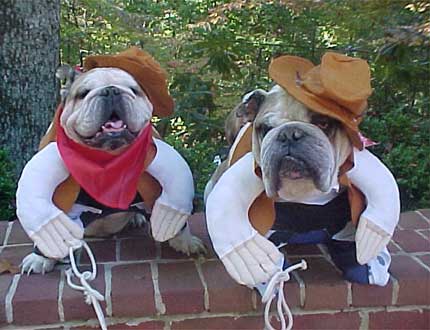
* * * * *